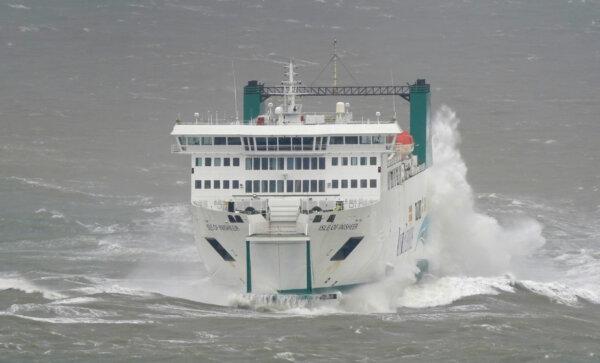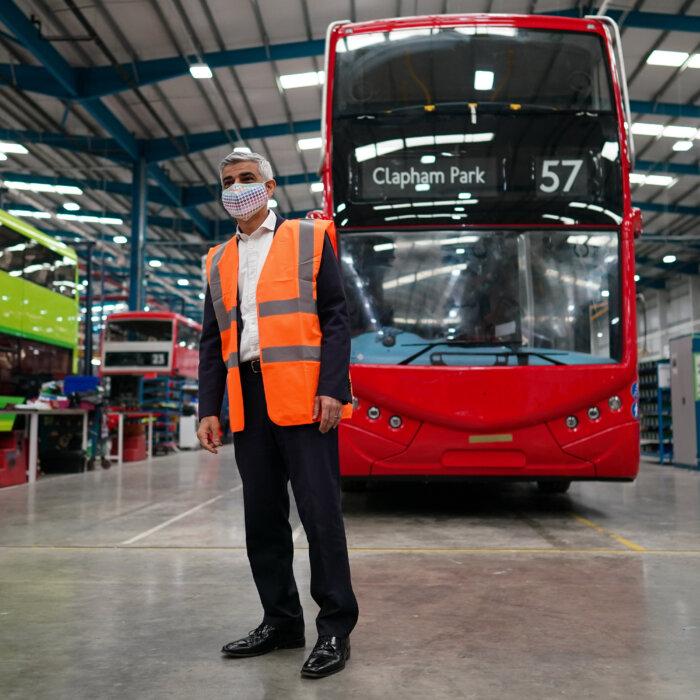A fire safety expert says there is “no quick answer” to the danger posed by electric vehicles catching fire on board ferries travelling to and from British ports.
Matt Humby, a senior technical consultant at fire extinguisher manufacturer Firechief Global, said ferry operators were investigating the risk of electric vehicles on board their vessels.
If a petrol or diesel-powered internal combustion engine (ICE) ignites on a ferry, it can be extinguished fairly quickly using sprinklers, but that is not the case with electric vehicles, which are powered by lithium battery packs—built into the chassis—which can go into “thermal runaway” for a number of reasons.
Mr. Humby said electric vehicles were “very challenging to put out” once they go into thermal runaway and he said it sometimes needed 30,000 litres of water to cool the battery module sufficiently for an electric vehicle fire to be put out.
Referring to the danger on board ferries, Mr. Humby told The Epoch Times: “The risks are very, very low. But they’re looking at containment measures because obviously if you’re starting to put thousands of litres of water on an electric vehicle on a ship, it’s going to be quite difficult, eventually you’re going to destabilise the vessel.”
Electric Vehicles Blamed for 2 Huge Ship Blazes
Bob Bull, from the Alliance of British Drivers, said there had been two suspicious fires involving electric vehicles being transported on ships—in February 2022 the Felicity Ace, which was carrying 4,000 electric and non-electric cars was destroyed by fire near the Azores, and in July 2023 the Fremantle Highway was gutted by fire off the Dutch coast.Mr. Bull said: “It’s only a matter of time before one will go up on a cross-channel ferry or in the channel tunnel.”
Sales of electric cars and other vehicles are rising as motorists see ICE vehicles as doomed, because of net zero targets.
Irish Ferries operate services from Dover to Calais and from Holyhead and Pembroke in Wales to Rosslare and Dublin in the Republic of Ireland.

Other popular ferry routes include Belfast and Larne, in Northern Ireland, to Stranraer and Portsmouth to Cherbourg but among the most concerning are long-distance voyages such as Plymouth to Santander and Newcastle to Amsterdam.
Electric vehicles are around 25 percent heavier than ICE vehicles, which means they have to be carefully positioned on board a ferry to make sure they do not destabilise it by loading too much weight on the port or starboard side, or at the front or the stern of the ship.
Electric Vehicles ‘More Liable to Re-ignite’
The notice warned that fires in electric vehicles, “may last longer and be more liable to re-ignite” and said there were, “significant differences in the best practices for fire detection and firefighting for electric vehicles.”It goes on to recommend electric vehicles be charged at ports before or after the crosing rather than on-board, saying it presented a, “lower risk profile, than charging onboard, even if that would be more convenient for the vehicle owners.”
The guidance goes on to say, “operators may wish to position electric vehicles under drenchers, on weather decks or away from dangerous goods” but it adds, “vehicle positioning is at the discretion of the operator.”
“It is a typical governmental report, it refuses to take responsibility for the result of its own legislation,” Mr. Marlow wrote.
Last month Conservative MP Bob Blackman, who is chair of the All Party Parliamentary Fire Safety and Rescue Group, said he did not believe the government had really recognised the fire risks lithium batteries and electric vehicles posed across a number of areas, including ferries.
He said: “Lithium is one of those chemicals which burns at a very high temperature ... and adding water to lithium is not a good plan either ... It is a very high risk, and our problem is that the technology and safety is not yet proven.”
A Department for Transport spokesperson told The Epoch Times in an email they had nothing to add, beyond the MCA guidance to ferry operators.
The Epoch Times contacted the Irish Ferries about the issues raised in this article but has not received a response.







